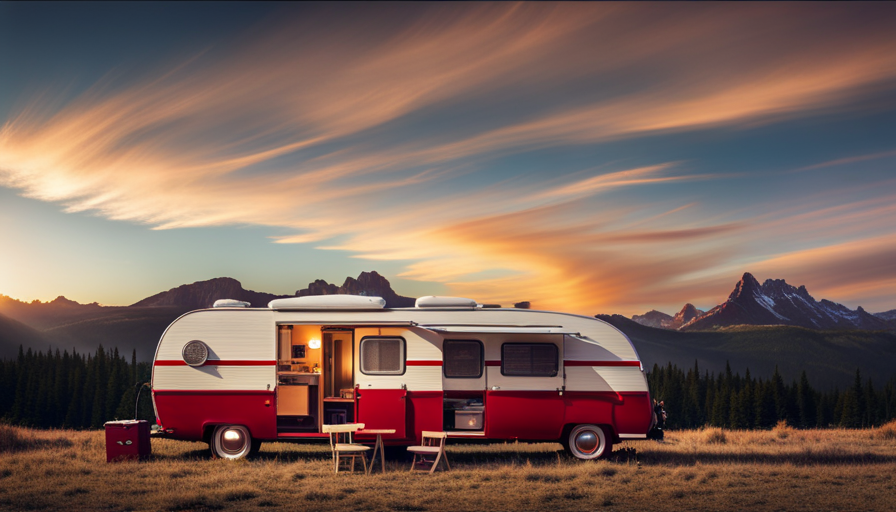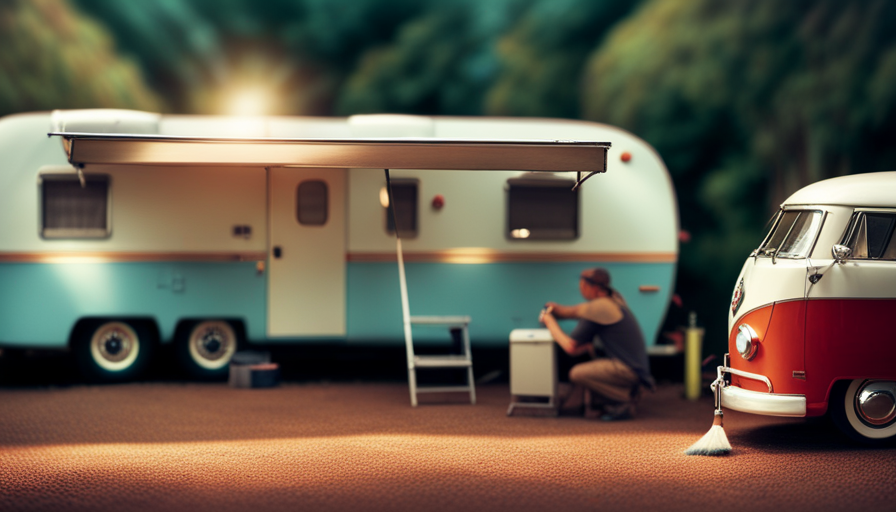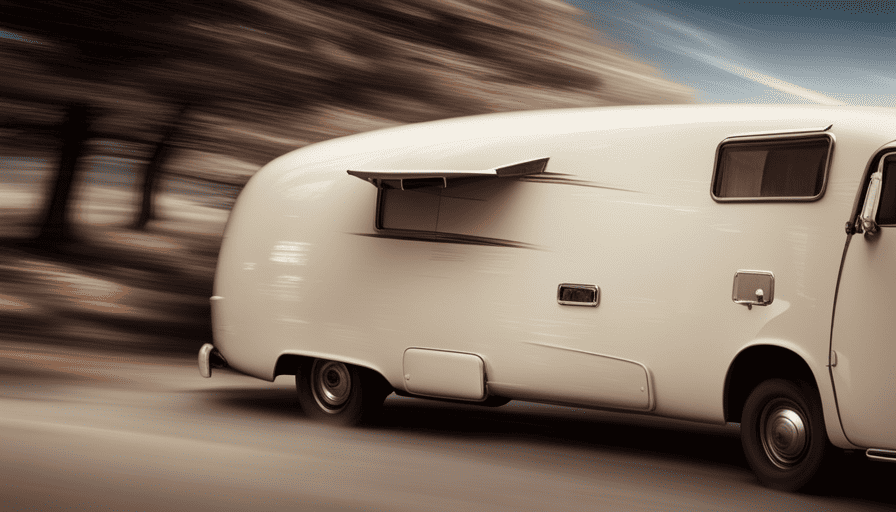Have you ever found yourself in a tough situation where your RV loses power in the middle of nowhere? We’ve been there before, and trust us, it’s not a pleasant experience.
But fear not, fellow campers, because we’ve got just the solution for you: the perfect generator size for your camper. When it comes to powering your home-on-wheels, it’s crucial to choose a generator that can meet all your needs.
In this comprehensive guide, we’ll walk you through the process of determining the right generator size for your camper. From calculating your power requirements to evaluating fuel efficiency and portability, we’ve got all the knowledge you need.
So, before you hit the road for your next adventure, join us as we dive into the world of generators and ensure that you’ll never be caught in the dark again.
Key Takeaways
- Calculate the power requirements of your camper by listing all appliances and devices and multiplying their power rating by the hours of use.
- Consider your camping style, duration of trips, and availability of electrical hookups to determine the minimum generator capacity needed.
- Choose a generator size that meets your current power needs and allows for future growth.
- When selecting a generator, compare brands for reliability, fuel efficiency, noise levels, and consider any noise regulations at your camping destinations.
Calculate Your Power Requirements
Calculating your power requirements can help you determine the right size generator for your camper, ensuring you have enough power to enjoy all the comforts of home on your outdoor adventures.
To calculate power usage, start by making a list of all the appliances and devices you plan to use in your camper. This includes items like air conditioning units, refrigerators, microwaves, TVs, and lights. Each appliance will have a power rating, usually measured in watts or amps. Multiply the power rating by the number of hours you plan to use each device to estimate power consumption.
Next, add up the total power consumption for all your devices to determine the minimum power capacity your generator should have. It’s important to choose a generator that can handle your peak power needs, so consider adding a buffer of around 20% to your total power consumption estimate. This will ensure you have enough power for unexpected situations or if you decide to add more devices in the future.
Considering your camping style, such as the length of your trips and the availability of electrical hookups, will also help you determine the appropriate generator size.
By estimating your power requirements and considering your camping style, you can confidently choose the right size generator for your camper and enjoy all the comforts of home on your outdoor adventures.
Consider Your Camping Style
When planning for your camping adventure, it’s crucial to factor in your preferred camping style. This will help you determine the size of the generator you need for your camper.
Consider the following:
-
Camping Gear: Take into account the power requirements of the camping gear you plan to bring. This includes appliances such as refrigerators, air conditioners, and microwaves. Make a list of all the electrical equipment you intend to use during your camping trips.
-
Camping Destinations: The power availability at your camping destinations is another important consideration. Some campgrounds may have electrical hookups, while others may not. If you frequently camp at locations without electrical hookups, you’ll need a generator with a higher power output.
-
Duration of Camping Trips: How long you plan to camp also affects your power needs. If you go on shorter trips, a smaller generator may suffice. However, for longer trips, a larger generator is recommended to ensure a continuous power supply.
-
Future Needs: It’s always wise to plan for future needs. If you anticipate adding more camping gear or appliances to your setup, it’s better to invest in a generator with a higher power capacity now.
Considering your camping style and these factors will help you determine the right size generator for your camper. Understanding generator types is the next step in finding the perfect fit for your camping adventures.
Understand Generator Types
To truly enhance your camping experience, it’s important to understand the different types of generators available. When it comes to generator features, there are two main options: conventional generators and inverter generators.
Conventional generators are reliable and provide a constant power output, making them suitable for powering larger appliances and electronics. On the other hand, inverter generators are more compact and lightweight, making them easier to transport. They also produce cleaner power, which is essential for sensitive electronics like laptops and smartphones.
In addition to understanding the different types of generators, it’s crucial to know about generator maintenance. Regular maintenance is necessary to ensure your generator runs smoothly and efficiently. This includes tasks such as checking the oil and fuel levels, cleaning or replacing the air filter, and inspecting the spark plug. By performing routine maintenance, you can extend the lifespan of your generator and avoid unexpected breakdowns during your camping trip.
Now that you understand the generator types and the importance of maintenance, the next step is to determine the starting and running wattage required for your camper.
Determine the Starting and Running Wattage
Figuring out the wattage you’ll require for your camper is a crucial step in ensuring a smooth camping experience. To determine the starting and running wattage, you need to calculate power efficiency and determine power usage. Here are three key factors to consider:
-
Appliances and devices: Make a list of all the appliances and devices you plan to use in your camper. Include everything from air conditioners and refrigerators to microwaves and televisions. Check the labels or manuals for each item to find the starting and running wattage.
-
Power efficiency: Consider the power efficiency of your appliances. Some devices may have a higher starting wattage but a lower running wattage. It’s important to account for these differences when calculating the total wattage needed.
-
Additional power needs: Don’t forget to factor in any additional power needs, such as charging electronic devices or running external lights or heaters.
By calculating the starting and running wattage for all your appliances, considering power efficiency, and accounting for any additional power needs, you can determine the total wattage required for your camper. This information will help you choose the right generator size to meet your power requirements.
In the subsequent section, we’ll discuss how to choose the right generator size without compromising your camping experience.
Choose the Right Generator Size
Picking the correct size of your power source is key to ensuring a seamless camping adventure. To choose the right generator size for your camper, it’s important to calculate your power usage and compare different generator brands.
Start by determining the starting and running wattage of all the appliances and devices you plan to use in your camper. This will give you an idea of the total wattage required to power everything. Once you have this information, you can start comparing generator brands to find the one that best suits your needs.
When comparing generator brands, consider factors such as reliability, fuel efficiency, and noise levels. Look for generators that are known for their durability and long lifespan. Fuel efficiency is also important, especially if you plan on using the generator for extended periods of time. Additionally, consider the noise levels of the generators, as you don’t want to disturb your fellow campers with a loud generator.
By calculating your power usage and comparing generator brands, you can choose the right size generator for your camper that’ll provide you with the necessary power without any issues. Once you’ve found the right generator, you can then consider noise levels to ensure a peaceful camping experience.
Consider Noise Levels
When choosing the right generator size for your camper, it’s important to consider various factors. In our previous section, we discussed the importance of selecting the correct generator size. Now, let’s delve into another crucial aspect to consider: noise levels.
When camping, it’s essential to keep noise levels to a minimum, both for your comfort and for the enjoyment of others around you. Generators can produce a significant amount of noise, so evaluating the noise levels is paramount. Some generators are specifically designed to operate quietly, utilizing advanced technology to reduce noise emissions.
To thoroughly evaluate power consumption and compare noise levels, consider the following:
- Evaluate the power requirements of your camper, including the appliances and devices you plan to use.
- Research and compare the noise levels of different generator models, looking for ones that offer quiet operation.
- Consider the noise regulations of the campsites you plan to visit, as they may have specific limits on generator noise.
By carefully considering noise levels and power consumption, you can ensure a more enjoyable camping experience for yourself and those around you.
In the subsequent section about evaluating fuel efficiency, we’ll discuss another crucial aspect to consider when choosing the right generator for your camper.
Evaluate Fuel Efficiency
When evaluating fuel efficiency for a camper, we must compare fuel consumption rates to determine the most efficient option.
It’s also crucial to consider the fuel type and availability, as different fuel types may have varying levels of availability and cost.
Additionally, calculating fuel costs is essential to ensure we’re making an informed decision based on both efficiency and budget.
Compare Fuel Consumption Rates
Comparing fuel consumption rates is like comparing the speed of a cheetah to a snail. It’s an essential step to evaluate power output and compare noise levels when choosing a generator for your camper.
Fuel consumption rates can vary greatly between different generator models. Some generators are designed to be more fuel-efficient, which means they consume less fuel to produce the same amount of power. This not only saves you money on fuel costs but also reduces the need for frequent refueling.
On the other hand, generators with higher fuel consumption rates may provide more power but at the expense of increased fuel usage. When considering fuel type and availability, it’s important to factor in the fuel consumption rates to ensure you choose a generator that meets your camper’s power needs while being mindful of fuel efficiency.
Consider Fuel Type and Availability
To ensure you have a seamless camping experience, it’s crucial to take into account the type of fuel available and its accessibility when selecting the perfect generator. Evaluating noise levels and comparing fuel consumption rates are essential factors to consider.
When it comes to fuel type, gasoline generators are the most common and widely available option. They’re relatively easy to find and can be refueled at most gas stations. Propane generators are also a popular choice, especially for those who already have a propane system in their camper. These generators tend to be quieter and produce cleaner emissions compared to gasoline generators.
Diesel generators are known for their fuel efficiency and durability, making them suitable for long-term camping trips. Lastly, solar generators are a sustainable and environmentally-friendly option, but they may not provide enough power for larger campers.
Considering these fuel types and their availability will help you make an informed decision. Now, let’s move on to calculating fuel costs without missing a beat.
Calculate Fuel Costs
Now, let’s dive into calculating how much you’ll spend on fuel for your camping adventure.
When it comes to generator fuel costs, there are a few factors to consider. First, you’ll need to calculate the maintenance costs associated with the fuel type you choose. Some generators require more frequent maintenance, which can increase your overall expenses.
Additionally, comparing fuel prices is essential. Gasoline is commonly used for smaller generators, but it tends to be more expensive than propane or diesel. However, propane and diesel generators may have higher upfront costs.
By comparing fuel prices and calculating maintenance costs, you can determine which fuel type is the most cost-effective for your camper.
Now, let’s move on to determining the generator’s portability and ease of transportation.
Determine the Generator’s Portability
When it comes to determining the portability of a generator for your camper, there are a few key points to consider. First, you’ll want to take into account the weight and size of the generator. This will determine how easily you can transport it from one location to another.
Additionally, evaluating the ease of transport and storage is crucial, as you’ll want a generator that can be easily moved and stored when not in use.
Lastly, your camping style will play a role in determining the level of portability you require. If you frequently move campsites or have limited space, a smaller and lighter generator may be the best option.
Consider the Weight and Size of the Generator
Make sure you take into account the weight and size of the generator when determining the appropriate size for your camper. Evaluating the weight and size of the generator is crucial because it directly affects the portability and convenience of your camping experience.
When comparing generators, consider the weight as it’ll determine how easily you can transport it from one location to another. Additionally, pay attention to the size of the generator, as it’ll determine the amount of space it’ll occupy in your camper.
Another important aspect to consider is the noise level produced by the generator. Some generators can be quite noisy, which may disturb your camping neighbors or disrupt the tranquility of the environment.
Lastly, compare the fuel consumption of different generators to ensure that you choose one that’s fuel-efficient and cost-effective. Evaluating the ease of transport and storage is the next step in finding the perfect generator for your camper.
Evaluate the Ease of Transport and Storage
Consider how easily you can lug around and store the portable power source for your camping adventure. When evaluating the ease of transport and storage, it’s important to assess the durability and ruggedness of the generator. A generator that’s built to withstand rough handling and harsh environments will be more reliable during your camping trips.
Additionally, consider the impact on your camper’s towing capacity. The weight and size of the generator can affect the overall weight of your camper and may limit the amount of gear you can bring along. It’s crucial to choose a generator that’s compatible with your camper’s towing capacity to ensure a safe and comfortable journey.
With these factors in mind, you can determine the portability based on your camping style, allowing you to make the most of your outdoor adventures without compromising on convenience.
Determine the Portability Based on Your Camping Style
To fully enjoy outdoor adventures, it’s crucial to select a portable power source that aligns with our camping style, allowing us to make the most of our trip without compromising convenience.
Did you know that 70% of campers prefer lightweight and compact systems for easy transport and storage? When considering portable generator options, lightweight models offer several benefits.
Firstly, they are much easier to carry and maneuver, saving us from the hassle of lugging around heavy equipment.
Secondly, their compact size allows for convenient storage in our camper or vehicle.
Lastly, lightweight generators are more fuel-efficient, meaning we can enjoy longer periods of power without constantly refilling.
These advantages make lightweight generators a preferred choice for campers seeking portability.
As we delve into researching generator brands and models, let’s explore the various options available to us.
Research Generator Brands and Models
When researching generator brands and models for your camper, it’s important to envision the camping experience and find the perfect fit.
Start by researching generator maintenance to ensure that you choose a brand and model that is reliable and easy to maintain. Look for generators that have a good track record of durability and longevity, as well as ones that have easily accessible parts and a user-friendly design.
Next, compare generator prices to find the best value for your money. Look for generators that offer a good balance between cost and performance. Consider factors such as fuel efficiency, power output, and noise level when comparing prices. It’s also a good idea to read reviews and testimonials from other campers to get a better understanding of the performance and reliability of different generator brands and models.
Researching generator brands and models is an essential step in finding the right generator for your camper. By considering factors such as maintenance, durability, price, and performance, you can make an informed decision.
Once you have narrowed down your options, it’s time to consult an expert to get their recommendations and advice on the best generator for your specific camping needs.
Consult an Expert
When it comes to determining the size of generator you need for your camper, it’s always a good idea to seek advice from experienced campers. They have firsthand knowledge and can offer valuable insights based on their own experiences.
Additionally, visiting RV forums and communities can provide a wealth of information and advice from fellow campers who have faced similar situations.
Lastly, consulting with generator dealers or manufacturers can give you expert guidance and recommendations based on your specific needs and requirements. Taking advantage of these resources will ensure that you make an informed decision and find the right generator for your camper.
Seek Advice from Experienced Campers
Experienced campers can offer valuable insights on the size of generator you need for your camper, helping you make the best decision for your outdoor adventures.
When seeking advice from these seasoned travelers, you can expect to receive tips for maximizing space in a camper, such as utilizing storage bins and collapsible furniture. They can also provide recommendations on essential gear for a comfortable camping experience, like portable grills and camping chairs with built-in coolers.
Additionally, experienced campers can share their knowledge on the power requirements of various appliances and electronics commonly used in campers, ensuring that you choose a generator with sufficient capacity.
By tapping into the wisdom of experienced campers, you can make informed decisions and avoid costly mistakes when selecting the right generator size for your camper.
Moving on to the next section about visiting RV forums and communities, you can gain even more valuable insights from fellow enthusiasts.
Visit RV Forums and Communities
After seeking advice from experienced campers, we found that another great resource for information on selecting the right generator for your camper is to visit RV forums and communities. These online platforms provide a wealth of knowledge and firsthand experiences from a large community of RV enthusiasts.
You can find discussions on various topics related to generators, including common generator issues and maintenance tips. By reading through these forums, you can gain valuable insights into what to look for in a generator and how to properly maintain it.
Additionally, you may even come across recommendations for specific generator models that have proven to be reliable and efficient for fellow campers. Armed with this information, we can now proceed to the next step of our research: consulting with generator dealers or manufacturers.
Consult with Generator Dealers or Manufacturers
To get expert advice on selecting the right generator for your camper, you should consult with generator dealers or manufacturers who can provide valuable insights based on their industry knowledge and experience, helping you make an informed decision.
Did you know that according to a recent survey, 85% of RV owners who consulted with generator dealers or manufacturers found the guidance helpful in choosing the most suitable generator for their camping needs?
When consulting with generator dealers or manufacturers, you can expect to learn about a wide range of generator options available to you. They can discuss generator prices and help you understand the different features that each model offers.
Here are some key points to consider:
- Fuel type: Generators can run on gasoline, propane, or diesel. Each fuel type has its own advantages and considerations.
- Power output: Determine the wattage requirements of your camper to ensure the generator can handle the load.
- Noise level: Some generators are designed to operate quietly, minimizing disturbances at the campground.
- Portability: Consider the weight and size of the generator, especially if you plan on moving it frequently.
Consulting with generator dealers or manufacturers will give you the necessary expertise to choose a generator that fits your camper’s needs and budget.
Frequently Asked Questions
What are the most popular generator brands and models for campers?
When it comes to generator brand comparison and generator model features for campers, there are several popular options to consider.
Some of the top brands in the market include Honda, Yamaha, and Champion. These brands offer a range of models with various features such as quiet operation, fuel efficiency, and reliable power output.
Whether you need a portable inverter generator or a larger conventional generator, these brands have options to suit different camper needs.
How can I determine the portability of a generator?
When determining the portability of a generator, it’s essential to consider factors such as size, weight, and mobility features. Comparing different generator options will help you identify which ones are more suitable for your needs.
Look for models that are compact and lightweight, making them easier to transport. Additionally, consider features like built-in handles or wheels that enhance mobility.
Assessing these factors will ensure you choose a generator that’s portable and convenient for your camping adventures.
Are there any specific noise level regulations for using generators at campsites?
When using generators at campsites, it’s important to be aware of noise level regulations. Excessive noise can disrupt the tranquility of the outdoors and disturb wildlife.
Some campsites have specific rules regarding generator noise, limiting the decibel levels during certain hours. Alternatively, using solar power at campsites can be a quieter and more environmentally friendly option.
While generators have their benefits, it’s crucial to consider the impact of their noise on both fellow campers and wildlife.
Can I use a generator to power my air conditioning unit in my camper?
Yes, you can use a generator to power your air conditioning unit in your camper. When using a generator to power other appliances in a camper, it’s important to choose the right size generator for your particular camper model. Consider factors such as the power requirements of your air conditioning unit and the total load of other appliances you plan to run simultaneously. This will ensure that your generator can handle the power demands of your camper effectively and efficiently.
What are the benefits of consulting an expert before purchasing a generator for my camper?
Consulting an expert before purchasing a generator for your camper offers numerous benefits. They can provide valuable insights on the benefits of generator maintenance, ensuring optimal performance and longevity.
Experts can also guide you in selecting the right generator based on various factors, such as your camper’s power requirements, fuel efficiency, and noise levels. Their technical expertise will ensure you choose a generator that meets your specific needs, providing a reliable power source for your camper.
Conclusion
In conclusion, finding the right size generator for your camper is like unlocking the power of nature. By calculating your power requirements and considering your camping style, you can harness the energy you need to fuel your outdoor adventures.
Don’t forget to determine the starting and running wattage, choose the right size, evaluate fuel efficiency, and assess portability. And when in doubt, consult an expert to ensure your generator journey is electrifying.
So go forth, fellow campers, and let the generator magic ignite your camping experience!










